
Senad SEVDİK
Scholar in Residence, Center for Eurasian Studies (AVİM)
Introduction
After 1990s, as Francis Fukuyama argues, the World has seen the “end of history” since the victory of liberalism over socialism. However, this change resulted the process of destabilization in Balkan region. This article seeks to investigate the possible future outcomes of the Peace Implementation Council’s new nomination of High Representative, Christian Schmidt to Bosnia and Herzegovina. Hence, it will first explain the current political and socioeconomic problems in BiH, secondly, it will illustrate the historical background of Germany’s foreign policy on BiH, thirdly, it will explain the “Bonn Powers” from 1997 up until our present time with its benefits, criticisms, and its conflictual legal framework. Finally, it will elaborate on the nomination of Christian Schmidt to BiH. Particularly, this article argues that Bonn Powers are still necessary in BiH for its territorial integrity and EU membership. However, these powers should be more legalized, equalized, and transparent to local actors in BiH.
Bosnia and Herzegovina’s current situation
Nowadays, Bosnia and Herzegovina’s daily news are still composed of ethnicized politics, conflictual municipal elections results, war time criminals’ trials and socioeconomic problems. BiH’s Central Election Commission’s decision for annulling the 15 November 2020 municipal elections results in the Srebrenica and Doboj towns, caused high criticism from Milorad Dodik, Serb member of BiH Presidency. In both towns, Dodik’s party, the Alliance of Independent Social Democrats, SNSD, had won the election.[1] Another obstacle for reconciliation of BiH’s people is war traumas. Accordingly, there was also commemoration of Markale marketplace victims in Sarajevo, where forty-seven people died in 1994.[2] Moreover, there are still social and humanitarian problems in BiH such as illegal pushbacks and violence against migrants.[3] Finally and importantly, BiH was ranked as the worst country in the Balkans, in terms of public corruption with taking 35 points out of 100. Thus, BiH has decreased by 10 places from 101st place to 111th place among 180 countries in 2020.[4]
Germany’s Hollow-Hearted Foreign Policy in BiH
According to Birgül Demirtaş, Germany’s foreign policy towards BiH was compatible with its traditional policy since WWII. Germany’s foreign policy was in the dilemma between “never Auschwitz again” (Nie wieder Auschwitz) and “never war again” (Nie wieder Krieg) during Bosnian war. Germany’ state identity policy was composed of multilateralism and loyalty to Western alliance which all implemented during Bosnian war. Therefore, Germany’s foreign policy was compatible with Alexander Wendt’s constructivist “state identity” concept. Especially, the domestic internal factors of Germany constructed Germany’s foreign policy towards Bosnian war; such as constitutional restrictions, “out of area” approach and unification problems.
Germany was the first country who recognized the independence of Croatia and Slovenia in December 1991. This huge mistake was criticized by EU countries and they accused Germany encouraging Yugoslavia to be dissolved. After the damage was done, Germany’s foreign policy was based on being “wary” towards Bosnian war. The reason of this early recognition was associated with the sensibility of the German people for their unification and deciding their fate, “self-determination”.[5] The former High Representative of BiH, Schwarz-Schilling (2006-2007), resigned from his post of Germany’s Federal Minister for Post and Communication since he was “ashamed” of chancellor Helmut Kohl (1982-1998), failing to act in Yugoslavia in 1992.[6]
Ischenger tried to explain the reason of Germany’s early recognition of Croatia and Slovenia in the following way: “The idea was so what if we recognize Croatia and Slovenia as independent sovereign countries at that point, the Yugoslav army would not dare attack a sovereign country that was legalistic German approach at the time. It was well intended but of course not really successful”.[7] The explanation was not convincing. Generally, Germany prioritized to give humanitarian assistance to Bosnians and accepting 400.000 refugees to Germany from BiH in this regard. Germany also insisted to include Russia in the peace solutions for BiH.[8]
There are mainly two parts which explain Germany’s non-policy on BiH. Firstly, Germany’s first post-war participation in Kosovo caused the decrease of the Bosnian war effects in German public consciousness such as Srebrenica massacre.[9] Secondly, Germany’s foreign policy shift caused negative effects on BiH during chancellor Merkel rule (2005-present). After “European debt crisis”, Germany’s foreign policy in Balkans further deteriorated and focused on “national interests-based European policy”.[10] However, although Germany was far from proactive European traditional policy, this change was not fully realized as it clearly did not provide foreign policy based on national interests. During chancellor Merkel rule, Germany’s role in EU is more based on protecting and preventing rather than guiding or producing.
Germany’s unilateral Merkel initiative for constitutional reform in BiH at the end of 2010, deteriorated government formation crisis in BiH and even created irritation in BiH and EU.[11] Chancellor Merkel’s policy was more about “disengaging from engagement” in BiH especially since 2009. Thus, Merkel’s policy was “controlling” the problems in BiH without solving them.[12] Economically, during 2005-2020, BiH’s exports to Germany were gradually increased to high levels. (See figure 1).[13]
Figure 1
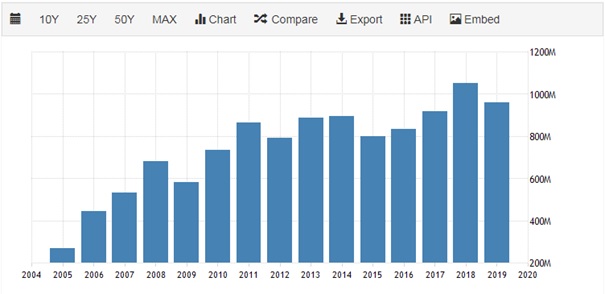
Source: Trading Economics
Finally, Germany and Russia’s roles in Peace Implementation Council’s Steering Board were destructive. Russia’s destructive role in PIC was clear since they supported Serb entity’s secessionist ideas and challenge against the Office of the High Representative (OHR) at every opportunity. Germany and Russia’s main policies in PIC were reluctance to take confrontational line in BiH.[14] While Germany rejected Bosnia’s Membership Action Plan (MAP) in 2010, Turkey strongly supported BiH’s MAP. After Turkey’s exclusion from Butmir process, Turkish Foreign Minister, Ahmet Davutoğlu took action of mediation roles between BiH and Serbia which resulted in Istanbul Declaration. Butmir process was a constitutional reform attempt in 2009 which aimed limiting veto powers of entities and creating efficient institutions. Thus, Turkey’s “consistent” policies in PIC’s Steering Board were crucial.[15]

Chronology of Bonn Powers and its legal framework
In 1997, the Peace Implementation Council met on 9 December 1997 in Bonn city of Germany and announced the so-called “Bonn Powers” under which a High Representative was given the authority to take binding decisions and final authority for the implementation of the Dayton agreement. Bonn powers allow the OHR to intervene or make policies at every administrative level, housing, education, legal system, citizenship, changing the constitution, policing, media, removal officials, electoral regulation, and many other areas.
More specifically, the OHR has utilized its Bonn Powers to impose symbols of Bosnian nationhood, e.g. the national flag and the national anthem and electoral engineering through supporting non-nationalist parties.[16] However, the OHR has passed excessive amounts of decisions in many areas, even dismissing politicians such as the President of Republika Srpska’s entity or the Croat Representative of the BiH Presidency (See Figure 2). For example, the President of Republika Srpska, Nikola Poplašen, was dismissed by the HR, Westendorp in 1999, after his refusal for giving a mandate to Milorad Dodik, currently the Serb President of RS entity.[17] Especially the High Representatives, Carlos Westendorp of Spain (1997-1999), Wofgang Petrich of Austria (1999-2002) and Paddy Ashdown of Great Britain (2002-2006), extensively used Bonn Powers to overcome obstructionism.
On the other hand, HR, Christian Schwarz-Schilling of Germany (2006-2007) believes the importance of altering the mindset of Bosnian people for learning to live without any imposition of order.[18] Additionally, the use of Bonn powers are associated with the colonization process. Thus, Carlos Westendorp’s statement to Wall Street Journal is crucial: “Yes, this disregards the principles of sovereignty, but so what? This is not the moment for post-colonial sensitivity […]. The problems of the region will only be solved when we have introduced a general respect for democracy and the rule of law”.[19]
Figure 2
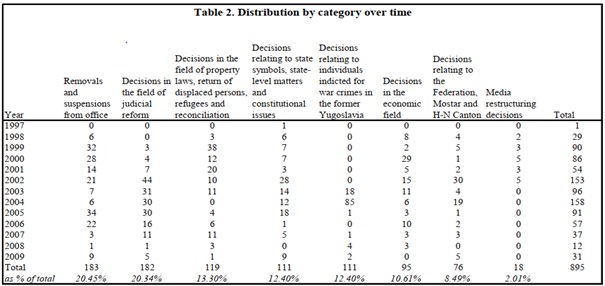
Source: Bart M. J. Szewczyk, “The EU in Bosnia and Herzegovina: Powers, Decisions and Legitimacy…”
The High Representative, Carlos Westendorp argued that: “If you read Dayton very carefully... Annex 10 even gives me the possibility to interpret my own authorities and powers”[20] Hence, BiH people and their elected representatives have been excluded from public discussions and their legitimacy is undermined by the OHR’s extensive Bonn Powers. Additionally, the OHR is solely accountable to the PIC so the OHR is not accountable to public which decreases the latter’s legitimacy.[21] Therefore, it is criticized that BiH became a international protectorate and controlled democracy with Bonn powers rather than a facilitator.[22] Hence, there should be more restricted limits on the use of the OHR’s Bonn powers. Many Croatian politicians believe that the current Croat member of BiH Presidency, Željko Komšić, was chosen by Bosniak voters to the Croat seat of the tripartite state’s presidency in 2006, 2010 and 2018 because of extensive Bonn powers.[23]
Finally, in terms of the legality of the Bonn Powers, one perspective stresses that Bonn powers should be considered as a rule of interpretation. Accordingly, Articles V and II (1) (d) of Annex 10 of the Dayton agreement are not sufficient for full legality of Bonn powers because they only allow OHR to coordinate local actors instead of imposing them. Article II (1) (d) states that High Representative shall “facilitate as the High Representative judges necessary, the resolution of any difficulties arising in connection with civilian implementation”[24] This perspective can also be supported by the Article 31 of the 1969 Vienna Convention on the Law of Treaties (VCLT) which emphasizes the importance of “interpretation” of a treaty.[25] Although the United Nations Security council affirms the Bonn powers of the OHR, this is not sufficient for its legality since the OHR is not even an organ of the UNSC.[26]
Another perspective stresses that Bonn powers are legitimate since the EU has always controlled and managed the civilian implementation of the Dayton agreement through de-facto control of the OHR. Moreover, most of the power exercised by OHR flows from the EU; direct aid of European Commission, the military presence of the EUFOR and ultimate access into EU membership. Particularly, the United Nations Security Council gave support to Bonn powers of the OHR in its resolutions under Chapter VII of the UN charter.[27] Therefore, these powers are legitimate since they are supported by public opinion.[28]
Christian Schmidts’ candidacy and its effects on EU-US Relations
After all, Germany has nominated Christian Schmidt as the next High Representative of BiH on 20 January 2021, through the Peace Implementation Council. Christian Schmidt is an influential member of the Bavarian Christian Social Union, CSU, which is chancellor Angela Merkel’s sister party, CDU. According to the German Ministry of Foreign Affairs, Germany with its nomination of Schmidt, wants to put BiH back on the international political agenda and has great interest for BiH’s development. Schmidt is a member of Bundestag and has participated in initiatives concerning the resolution of problems in Balkans. It is also stressed that Germany has taken the candidacy decision of Schmidt with close coordination of the Steering Committee members of the Peace Implementation Council.[29]
In addition, Christian Schmidt has also persuaded Milorad Dodik and Dragan Čović, the Serb and Croat Member of the BiH Presidency respectively, for permitting the implementation of the EU’s Stabilization and Association Process in 2015. Christian Schmidt’s candidacy also illustrates the strong solidarity between Germany and Croatia since he was given the award of “Order of Ante Starčević” for his contributions to the development of Croatian State.[30] He actively supports the Balkans Countries’ membership in the EU. He is also sensitive in terms of treatment towards migrants who desire to reach Europe through the Balkans and the Mediterrean Sea. Although Germany has close ties with Russia and wants to protect their good relations, especially for their satisfaction on energy needs, Christian Schmidt is known to be highly critical towards Russia. However, Germany’s sudden nomination was considered suspicious in terms of its timing (Biden’s inauguration) as well as a pre-empt move against Joe Biden’s possible re-engagement in BiH on 20 January 2021. Therefore, the justified criticisms concerned why Germany suddenly attempted to replace the current High Representative, Valentin Inzko, after 12 years of inaction. Germany’s nomination is seen as a preference in favor of status-quo rather than a policy shift in BiH. If this nomination is taken without any consultation from the US, then this lack of unity between EU and US will worsen the political integrity in BiH, as it did in the Bosnian war.[31]
The OHR and its Bonn Powers depend on the support of the Peace Implementation Council, PIC. However, Russia, as a PIC member has insisted to undermine the work of the OHR by supporting the Serb member of the BiH Presidency, Milorad Dodik, and his secessionist ideas for Republika Srpska entity. Therefore, apart from the US and the UK in the PIC, other countries in the Steering Board of the PIC, such as Germany and Russia, prefer to protect status-quo rather than resist against local elites in BiH. Therefore, Christian Schmidt will be ineffective, if there is a lack of Western unity behind him. Germany’s energy needs and its commitment to Russia’s Nordstream 2 pipeline also allows the absence of objections to Russia’s interests in BiH. Hence, Bosnian media acknowledge that Germany is trying to prevent Joe Biden’s hawkish policies on Russia with controlling BiH through the nomination of Christian Schmidt.
On the other hand, Russian ambassador in Serbia, Alexander Botsan-Kharchenko, stressed that Moscow did not approve the new nomination of Schmidt to OHR. He added that OHR’s closure should be discussed instead of appointing new representative to BiH. Russia also has veto power in UN Security Council for the confirmation of OHR’s nomination.[32]Another reason for Schmidt’s nomination is that Berlin does not want to be controlled by two non-EU states of US and UK in BiH.[33] Overall, it is still uncertain that there is a full unity between EU and US for Schmidt nomination against Russia’s opposition.
Conclusion
As a result, in my own opinion, BiH does not need changing or appointing new High Representatives for satisfying other great powers ‘interests or imposing more Bonn powers. BiH and its people need more guidance to alter their mindset, acknowledge all the war’s human crimes such as Srebrenica confirmed as genocide in accordance with stipulations 1948 Convention on Human Rights and resolutely stand against ethno-politicians. Thus, Alexander Wendt’s “collective identity” can be produced by BiH state which should prioritize norms and rules over ethnic differences of people so that “us” feeling can be established in BiH’s community, same as in EU. Hence, the change must be originated from bottom-up process and only wholehearted efforts of powers such as Turkey, US, UK and hopefully Germany should give a hand to Bosnian people.
Germany should act with good faith in BiH with showing strong resistance to ethno-nationalists and reforming the country in a better way. Germany should give up its traditional “non-policy” on BiH and it should be more determinant and stand against ethno-political elites in BiH. Germany and EU should consult UK and US for every critical decision in BiH. Christian Schmidt needs to use his Bonn powers in a transparent, equal, and legalized way with strong support of US and EU. Consequently, candidate HR, Christian Schmidt can increase the legitimacy of Bonn powers through public hearing, including a summary of facts and their legal association to the Dayton agreement.
Finally, Turkey is in a position to oversee the use of the Bonn Powers in the PIC Steering Board in an impartial manner. According to the practice so far, the use of these powers is decided with consensus in the PIC Steering Board. There is no procedure in the PIC Steering Board to decide on with majority vote. In this context, it should be underlined that Turkey's equal say in the PIC Steering Board, has a key role in preserving the integrity of Bosnia- Herzegovina and especially defending the rights of the Bosniaks. Turkey should meticulously keep its place in the PIC Steering Board. The presence of Turkey in PIC Steering Board is not only an insurance for the integrity of BiH but also for the security and stability of entire Balkans, hence Europe.
*Photograph: Anadolu Agency and EU Observer
[1] Danijel Kovacevic, “Bosnia Election Commission to Sue Dodik for Inciting National Hatred,” Balkan Insight, January 28, 2021, https://balkaninsight.com/2021/01/28/bosnia-election-commission-to-sue-dodik-for-inciting-national-hatred/
[2] Nejra Dzaferagic, “Bosnians Mourn Victims of 1994 Sarajevo Market Massacre,” Balkan Insight, February 5, 2021, https://balkaninsight.com/2021/02/05/bosnians-mourn-victims-of-1994-sarajevo-market-massacre/
[3] Anja Vladisavljevic, “UNHCR Presses Croatia to Halt Unlawful Border Pushbacks,” Balkan Insight, January 28, 2021, https://balkaninsight.com/2021/01/28/unhcr-presses-croatia-to-halt-unlawful-border-pushbacks/
[4] Milica Stojanovic, “Corruption Perceptions Worsening in Balkans, Central Europe, Transparency Says,” Balkan Insight, January 28, 2021, https://balkaninsight.com/2021/01/28/corruption-perceptions-worsening-in-balkans-central-europe-transparency-says/
[5] Birgül Demirtaş, “Ankara ve Berlin’in Bosna Savaşı’na Yönelik Politikaları: Karşılaştırmalı Bir İnceleme,” Uluslararası İlişkiler/International Relations 4, no. 13 (2007).
[6] “Profile: Christian Schwarz-Schilling,” BBC News, January 30, 2006, http://news.bbc.co.uk/2/hi/europe/4662246.stm
[7] “Dayton at 25 - Bosnia and Herzegovina as a Transatlantic Challenge: Then and Now,” European Council on Foreign Relations (ECFR), YouTube video, December 17, 2020, https://www.youtube.com/watch?v=1P6MCuLp7dA
[8] Demirtaş, “Ankara ve Berlin’in Bosna Savaşı’na Yönelik Politikaları: Karşılaştırmalı Bir İnceleme.”
[9] Weber, Bodo. "Germany’s shift on Bosnia policy." Democracy and Security in Southeastern Europe 2, no. 6-7 (2011): 13-18.
[10] Weber, Bodo. "Germany’s shift on Bosnia policy."
[11] Weber, Bodo. "Germany’s shift on Bosnia policy."
[12] Weber, Bodo. "Germany’s shift on Bosnia policy
[13] “Bosnia and Herzegovina Exports to Germany - 2003-2019 Data | 2021 Forecast,” TradingEconomics.com, 2020, https://tradingeconomics.com/bosnia-herzegovina/exports/germany
[14] Bassuener, Kurt and Bodo Weber, "Are we there yet? International impatience vs. a long-term strategy for a viable Bosnia," Democratization Policy Council, Retrieved from http://www.democratizationpolicy.org/pdf/policybrief1.pdf (2010)
[15] Bassuener and Weber, "Are we there yet”.
[16] Niels van Willigen, “From Nation-Building to Desecuritization in Bosnia and Herzegovina,” Security and Human Rights 21, no. 2 (June 1, 2010): 127–38, https://doi.org/10.1163/187502310791305864
[17] Florian Bieber, “Aid Dependancy in Bosnian Politics and Civil Society: Failures and Successes of Post-War Peacebuilding in Bosnia-Herzegovina,” Croatian International Relations Review 8, no. 26/27 (January 1, 2002): 25–29, https://hrcak.srce.hr/index.php?id_clanak_jezik=10714&show=clanak
[18] Christian Schwarz-Schilling, “Article by Christian Schwarz-Schilling, High Representative for BiH: ‘Bosnia’s Way Forward,’” Office of the High Representative, March 17, 2006, http://www.ohr.int/article-by-christian-schwarz-schilling-high-representative-for-bih-bosnias-way-forward/
[19] Danijela Majstorović, “Construction of Europeanization in the High Representative’s Discourse in Bosnia and Herzegovina,” Discourse & Society 18, no. 5 (September 2007): 627–51, https://doi.org/10.1177/0957926507079635
[20] David Chandler, “From Dayton to Europe,” International Peacekeeping 12, no. 3 (October 2005): 336–49, https://doi.org/10.1080/13533310500074077
[21] Richard Caplan, “International Authority and State Building: The Case of Bosnia and Herzegovina,” Global Governance: A Review of Multilateralism and International Organizations 10, no. 1 (August 3, 2004): 53–65, https://doi.org/10.1163/19426720-01001006
[22] Dzenan Sahovic, “Socio-Cultural Viability of International Intervention in War-Torn Societies: A Case Study of Bosnia Herzegovina,” DIVA (Statsvetenskap, 2018), https://www.diva-portal.org/smash/record.jsf?pid=diva2%3A139949&dswid=-7122
[23] Ivan Pepic, “The next High Representative Must Reconsider European Power-Sharing Solutions for Bosnia,” New Eastern Europe - A bimonthly news magazine dedicated to Central and Eastern European Affairs, January 25, 2021, https://neweasterneurope.eu/2021/01/25/the-next-high-representative-must-reconsider-european-power-sharing-solutions-for-bosnia/
[24] Tim Banning, “The Bonn Powers of the High Representative in Bosnia Herzegovina: Tracing a Legal Figment,” Goettingen Journal of International Law 6, no. 6 (2014): 259–302, https://heinonline.org/HOL/LandingPage?handle=hein.journals/gojil6&div=17&id=&page=
[25] Banning, “The Bonn Powers of the High Representative in Bosnia Herzegovina…”
[26] Banning, “The Bonn Powers of the High Representative in Bosnia Herzegovina…”
[27] Bart M. J. Szewczyk, “The EU in Bosnia and Herzegovina: Powers, Decisions and Legitimacy,” papers.ssrn.com (Rochester, NY, 2010), https://papers.ssrn.com/sol3/papers.cfm?abstract_id=1881717
[28] Szewczyk, “The EU in Bosnia and Herzegovina: Powers, Decisions and Legitimacy…”
[29] “Kandidatur von Bundesminister A.D. Christian Schmidt Für Das Amt Des Hohen Repräsentanten Für Bosnien Und Herzegowina,” Auswärtiges Amt, January 20, 2021, https://www.auswaertiges-amt.de/de/newsroom/-/2435772
[30] Emir Suljagic and Reuf Bajrovic, “ANALYSIS – a New High Representative in Bosnia?,” Anadolu Agency, January 8, 2021, https://www.aa.com.tr/en/analysis/analysis-a-new-high-representative-in-bosnia/2102873
[31] Kurt Bassuener and Toby Vogel, “[Opinion] Why Is Germany Rushing a New Bosnia High Representative?”, EU Observer, January 27, 2021, https://euobserver.com/opinion/150730
[32] Y.Z., “Russia Has Returned the Appointment of a New High Representative to the Beginning,” Sarajevo Times, February 14, 2021, http://www.sarajevotimes.com/russia-has-returned-the-appointment-of-a-new-high-representative-to-the-beginning/
[33] Jasmin Mujanovic, “Germany’s Push for New High Representative to Bosnia Is Worrying,” Balkan Insight, December 29, 2020, https://balkaninsight.com/2020/12/29/germanys-push-for-new-high-representative-to-bosnia-is-worrying/
© 2009-2025 Avrasya İncelemeleri Merkezi (AVİM) Tüm Hakları Saklıdır
Henüz Yorum Yapılmamış.
-
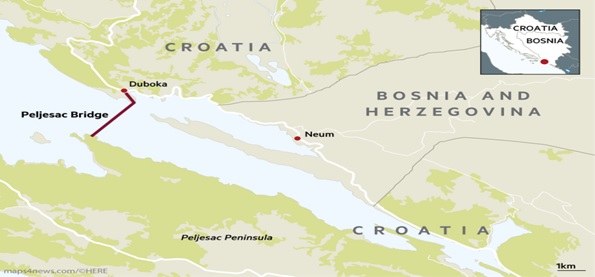 THE FINAL COUNTDOWN TO SAVE THE OTTOMANS’ LAST LEGACY IN BIH FROM THE ENCIRCLEMENT OF PELJESAC BRIDGE
THE FINAL COUNTDOWN TO SAVE THE OTTOMANS’ LAST LEGACY IN BIH FROM THE ENCIRCLEMENT OF PELJESAC BRIDGE
Senad SEVDİK 22.02.2021 -
 GERMANY’S HIGH REPRESENTATIVE CANDIDATE IN BIH, CHRISTIAN SCHMIDT, AND HIS POSSIBLE USE OF BONN POWERS - 07.04.2021
GERMANY’S HIGH REPRESENTATIVE CANDIDATE IN BIH, CHRISTIAN SCHMIDT, AND HIS POSSIBLE USE OF BONN POWERS - 07.04.2021
Senad SEVDİK 26.04.2021 -
 ALMANYA’NIN BOSNA-HERSEK’TEKİ YÜKSEK TEMSİLCİ ADAYI, CHRİSTİAN SCHMİDT VE ONUN MUHTEMEL BONN YETKİLERİNİ KULLANMASI - 02.05.2021
ALMANYA’NIN BOSNA-HERSEK’TEKİ YÜKSEK TEMSİLCİ ADAYI, CHRİSTİAN SCHMİDT VE ONUN MUHTEMEL BONN YETKİLERİNİ KULLANMASI - 02.05.2021
Senad SEVDİK 05.05.2021 -
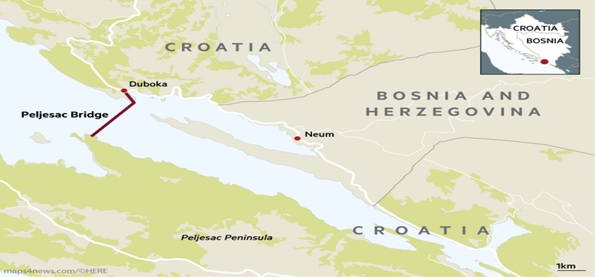 OSMANLI’NIN BOSNA-HERSEKTE’Kİ SON MİRASINI PELJESAC KÖPRÜSÜ’NÜN KUŞATMASINDAN KURTARMAK İÇİN SON FIRSAT
OSMANLI’NIN BOSNA-HERSEKTE’Kİ SON MİRASINI PELJESAC KÖPRÜSÜ’NÜN KUŞATMASINDAN KURTARMAK İÇİN SON FIRSAT
Senad SEVDİK 26.02.2021
-
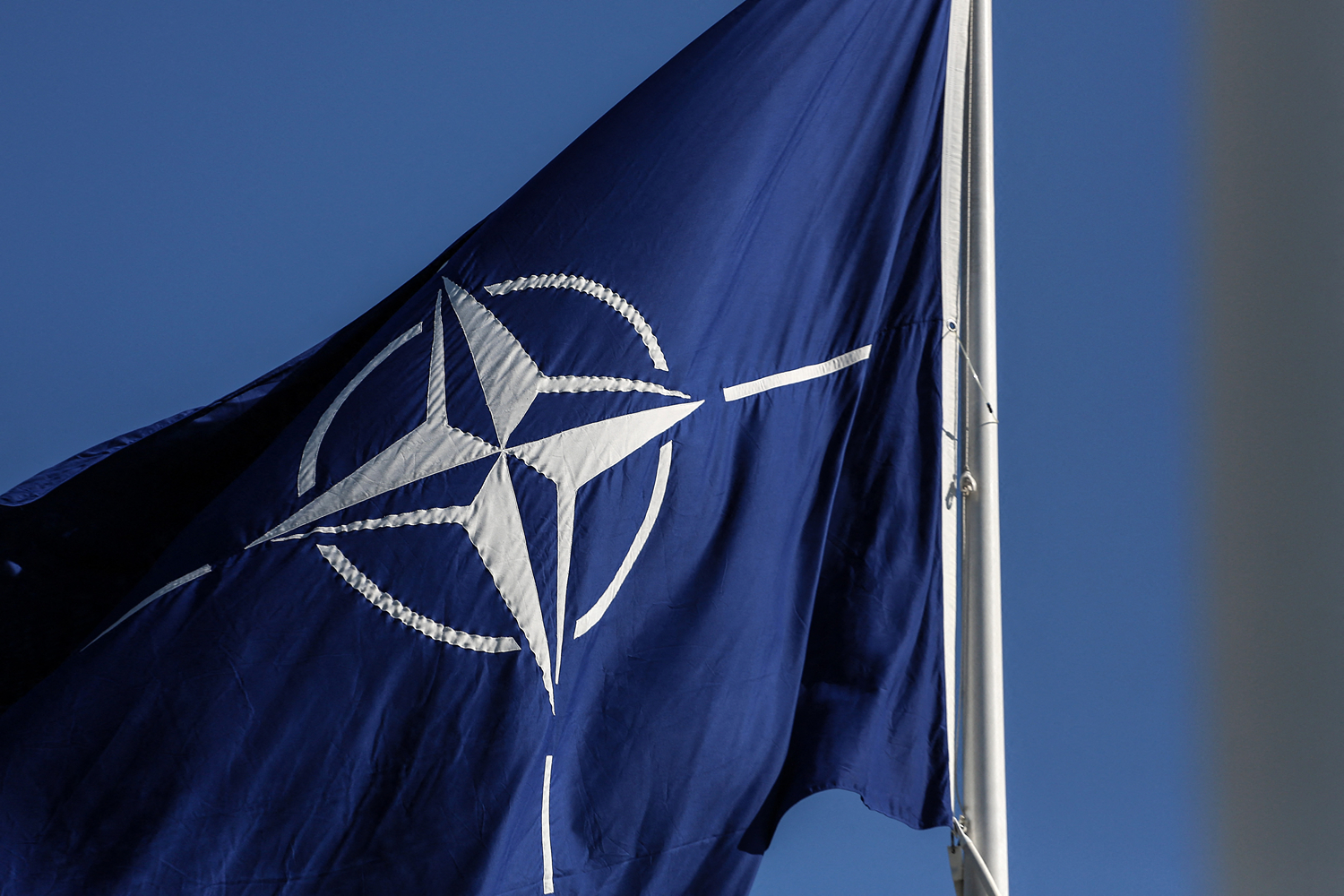 RETHINKING NATO TO MAKE IT STRONGER - 03.02.2023
RETHINKING NATO TO MAKE IT STRONGER - 03.02.2023
Jakub KOREJBA 03.02.2023 -
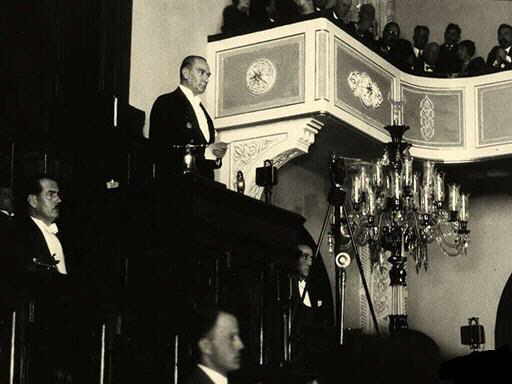 ERMENİ İDDİALARI KONUSUNDA ATATÜRK NE DEMİŞTİ?
ERMENİ İDDİALARI KONUSUNDA ATATÜRK NE DEMİŞTİ?
Onur ÖYMEN 18.01.2018 -
 BLACK SEA ECONOMIC COOPERATION AND SECURITY IN THE BLACK SEA: IN VIEW OF THE DRONE CONFLICT BETWEEN RUSSIA AND THE US - 24.03.2023
BLACK SEA ECONOMIC COOPERATION AND SECURITY IN THE BLACK SEA: IN VIEW OF THE DRONE CONFLICT BETWEEN RUSSIA AND THE US - 24.03.2023
Deniz ÜNVER 24.03.2023 -
BOSNA SEÇİMİNDE SOLUN EROZYONU
Erhan TÜRBEDAR 11.10.2012 -
 OSMANLI’NIN BOSNA-HERSEKTE’Kİ SON MİRASINI PELJESAC KÖPRÜSÜ’NÜN KUŞATMASINDAN KURTARMAK İÇİN SON FIRSAT
OSMANLI’NIN BOSNA-HERSEKTE’Kİ SON MİRASINI PELJESAC KÖPRÜSÜ’NÜN KUŞATMASINDAN KURTARMAK İÇİN SON FIRSAT
Senad SEVDİK 26.02.2021


